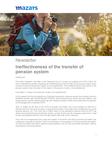
Ineffectiveness of the transfer of pension system
information in charge of the pension funds is not complied with.
In this regard, the Court recalled that in Colombia two pension systems coexist: the Average Premium Solidarity System with Defined Benefit (RPMPD), administered by the Social Security Institute, now Colpensiones, and the Individual Savings with Solidarity System (RAIS), administered by the pension fund management companies (AFP).
Now, in relation to the duty of the AFPs to provide information, the Court pointed out that this is derived from the "free and voluntary" choice that the worker must make when affiliating to any of the regimes (literal b. Art. 13 of Law 100 of 1993), which is only possible to achieve when the AFP has clearly and sufficiently documented the worker, so that he/she has the necessary elements to make a clear and objective decision as to the best option that suits his/her interests.
Thus, the Court emphasizes that, since the creation of the AFPs, the duty to provide information has undergone a regulatory evolution, which it summarizes in three stages: (i) Duty to provide information; (ii) Duty to provide information, advice and good advice, and (iii) Duty to provide information, advice, good advice and double advice.
Therefore, in the words of the Court, "the judge must evaluate the fulfillment of the duty of information according to the historical moment that should be fulfilled, but without losing sight of the fact that this duty has existed from the beginning".
Likewise, the Court reiterated that this duty cannot be understood as satisfied with the simple filling out of the affiliation form, since this requires the verification of a true informed consent which, in the case of a change of regime, "must be preceded by an illustration to the worker or user, at least, about the characteristics, conditions, access, advantages and disadvantages of each of the pension regimes, as well as the risks and consequences of the transfer".
On the other hand, the Court also referred to the application of the principle of the burden of proof in these cases. In this regard, it pointed out that, in accordance with article 1604 of the Civil Code, it is up to the pension fund to prove the execution of all the actions aimed at informing the member of the implications of the transfer of the pension system, taking into account its position in the market, professionalism, expertise and control of the operation, since it would be absurd to reverse the burden of proof against the member, who is the weak party in the contractual relationship.
In conclusion, the aforementioned Ruling of the Labor Chamber of the Supreme Court of Justice unifies the jurisprudence issued by that corporation with respect to the transfer of the pension system, making it clear that the duty of information that the pension funds have, and which is inspired by the principles of prevalence of the general interest, transparency and good faith of the person who provides a pension plan, is not only a duty of the pension funds, but also a duty of the member to provide information to the pension funds, which is inspired by the principles of transparency, transparency and good faith of the person who provides a pension plan, transparency and good faith of those who provide a public service, has certain minimum parameters that must be analyzed in accordance with the regulations in force at the time when it was required, since the validity of the affiliation or transfer of the pension system depends on its compliance, without it being necessary that the person has a pension expectation for its verification.


